#property for sale in ireland
Explore tagged Tumblr posts
Text

Find residential houses,apartments,flats commercial properties for sale rent from Property24 7 Signup for free now get best Property for Sale in Ireland - https://www.property24-7.ie/
1 note
·
View note
Video
youtube
Carrowroe Williamstown Co Galway
#youtube#ireland#Knock#rural life#bungalow#land#Salthill Beach#galway university#builders#popular#for sale#Property Developers#Irish Diaspora#Bargain
2 notes
·
View notes
Text
With Property for Sale Signs at Historic Lows in Ireland!
Is Now the Ideal Time to Engage an Estate Agent in Dublin and Kildare?
Ireland is currently facing a significant housing crisis, marked by an acute shortage of properties available for sale. This drought in the housing market has been a growing concern, impacting not just major cities like Dublin and Kildare but extending to rural areas as well. The scarcity of homes has inflated prices, putting homeownership out of reach for many first-time buyers and creating a competitive and challenging environment for those looking to purchase a property.
This situation poses a critical question for potential buyers and investors alike—is now the opportune moment to engage an estate agent in Dublin and Kildare to navigate this sparse marketplace?
Given this backdrop of a tightly squeezed housing market, one might ponder if this current climate presents a tactical advantage for those contemplating selling or buying properties. Is engaging with an estate agent now, more than ever, a wise move for prospective sellers who could potentially command higher prices due to the scarcity?
Similarly, for buyers, does an estate agent’s expertise and network offer a valuable lifeline in navigating through this competitive landscape, possibly uncovering hidden gems or negotiating favourable terms? This question becomes particularly pressing for individuals looking to make a timely and strategic entry or exit in the market.
Current Property Market Trends in Ireland

Recent statistics on property sales in Dublin and Kildare illustrate a nuanced landscape. In Dublin, the average house price has seen a significant upswing, reflecting the intense competition among buyers for a limited stock of available homes. This trend echoes through Kildare as well, where demand outstrips supply, driving prices upward.
According to the latest reports, Dublin has experienced a price increase of approximately 8% over the past year, while Kildare follows closely with a climb of 7%. This acceleration in prices is coupled with a decline in the volume of transactions, underscoring the scarcity of listings. The compressed inventory is not merely a metropolitan phenomenon but pervades the countryside, indicating a nationwide challenge.
These dynamics suggest that the current market conditions, characterised by slim pickings and ascending prices, may offer a strategic advantage to sellers. However, they also pose significant hurdles for buyers, necessitating skilled navigation to find value and secure a purchase in these highly competitive settings.
What factors have led to our current housing crunch?
Several factors contribute to the historic lows in property for sale signs across Ireland, with economic influences and market sentiments playing pivotal roles. The aftermath of the previous financial crisis still lingers, making potential sellers cautious about entering the market, fearing uncertainties and potential economic downturns. Additionally, the construction industry has not fully recovered, resulting in a slower rate of new builds and further exacerbating the housing shortage.
Economic vibrancy in sectors like technology and pharmaceuticals has led to increased employment opportunities, particularly in urban areas such as Dublin and Kildare. This influx of a workforce has spiked the demand for housing, outpacing the supply and contributing to the scarcity of available properties. Coupled with this is the rising cost of construction, driven by higher material costs and stricter building regulations, which deter new developments and limit supply.
Market sentiments are also a significant factor. Many homeowners are holding onto their properties longer, anticipating further price increases or unwilling to sell due to the high cost of moving and a lack of suitable alternatives. This reluctance to sell, fuelled by the fear of not finding another home within the same area or price range, creates a cycle that keeps the number of properties on the market at historic lows.
Furthermore, government policies and lending criteria have become more stringent, making it harder for new buyers to enter the market, thereby reducing the incentive for existing homeowners to sell. With the combination of these economic and psychological factors, the real estate market in Ireland faces a complex challenge that requires innovative solutions to increase the supply and restore balance.
Advantages of Engaging an Estate Agent Now
Expert Market Insight for Buyers and Sellers alike.
In the face of the challenges detailed above, the expertise of an estate agent becomes invaluable. Estate agents possess a thorough understanding of the current real estate market and are adept at forecasting potential shifts and trends. This insight is pivotal in today’s volatile market where making informed decisions can significantly impact the outcome of selling or buying a property.
For sellers, estate agents can offer strategic advice on when to list their property to maximise returns. They understand the nuances of the local market in Dublin and Kildare, such as seasonal buying trends and the preferences of local buyers. This local expertise can be used to tailor marketing strategies, ensuring the property reaches the right audience at the right time.
Buyers, on the other hand, benefit from an estate agent’s ability to quickly identify properties that meet their requirements and budget, often gaining access to listings before they are widely advertised. Estate agents can also provide an objective analysis of a property’s worth, helping buyers to make competitive offers that are also in line with market values. Their negotiation skills become a critical asset in securing a favourable deal in a market where every advantage counts.
In sum, the current scarcity in the housing market presses the need for an expert ally. An estate agent’s deep market knowledge and strategic insights not only enhance the buying or selling experience but can also lead to more favourable outcomes in a highly competitive environment.
Buying Tips in a Low-Inventory Housing Market
Navigating a property market with scant availability requires strategic thinking and a proactive approach. In a landscape where demand far surpasses supply, particularly in areas like Dublin and Kildare, potential buyers, looking for houses for sale, must employ innovative tactics to uncover hidden gems and negotiate effectively. Here are practical tips for those looking to secure a home in such challenging conditions:
Expand Your Search Parameters: Don’t limit your search to popular portals alone; consider other avenues such as estate agent listings, local newspapers, and even word-of-mouth. Sometimes, properties are advertised through less common channels or could be coming to the market soon. Building a rapport with local estate agents can grant you access to these early listings.
Consider Off-Market Properties: Some homeowners may be considering selling but haven’t officially listed their property. Estate agents often know of such potential sellers, so expressing interest could put you at the front of the line when they decide to sell.
Be Financially Prepared: In a competitive market, the readiness to move quickly can set you apart. Ensure you have mortgage pre-approval and your financial documentation in order. Demonstrating that you can proceed without delay is appealing to sellers who are keen to close.
Flexibility and Compromise: Given the low inventory, being open to compromise on some of your criteria can open up more possibilities. While it’s important not to settle for a property that doesn’t meet your fundamental needs, flexibility on less critical aspects can be beneficial.
Craft a Compelling Offer: A well-thought-out offer that goes beyond price can sometimes sway sellers in your favour. Consider flexibility on closing dates, a higher deposit, or minimal contingencies as potential ways to make your offer stand out.
Stay Informed: Understanding current market conditions and pricing can arm you with the knowledge to negotiate effectively. An informed buyer is in a stronger position to assess a property’s market value and negotiate accordingly.
Patience and Perseverance: Finally, it’s crucial not to rush into a purchase due to frustration or fear of missing out. Take the time to ensure that the property meets your needs and represents fair market value. Sometimes, patience leads to finding the perfect property at the right price.
In these trying market conditions, applying these strategies can enhance your chances of finding and successfully purchasing a property. Remember, aligning with seasoned professionals such as Howley Souhan Estate Agents can provide you with the insider knowledge and expertise necessary to navigate the Dublin and Kildare real estate market successfully.
Selling Strategies in Today’s Property Market
In today’s challenging real estate landscape, particularly within the competitive markets of Dublin and Kildare, sellers must adopt innovative marketing strategies that not only attract potential buyers but also stand out from the limited inventory. The key lies in presenting your property in a way that resonates with the target audience and utilising multiple channels to ensure wide visibility. Here are several effective strategies to consider, if you want to sell your property:
Professional Staging and Photography: First impressions are crucial. Professional staging, coupled with high-quality photography, can significantly enhance the appeal of your property online, where most buyers start their search. These services highlight the strengths of your property and can evoke an emotional connection even before a viewer steps through the door.
Virtual Tours and Open Houses: Leveraging technology to offer virtual tours can widen your pool of potential buyers, including those who might not be in the immediate area but are considering relocation. Virtual open houses can also cater to busy schedules, ensuring that more interested parties can engage with your property at their convenience.
Targeted Online Marketing: Utilising the power of social media platforms and targeted digital advertising can ensure that your property reaches a broader, but more importantly, relevant audience. Tailoring your message to suit the demographics that are most likely to be interested in your property ensures that your marketing efforts are more efficient and effective.
Engage with Local Estate Agents: A local estate agent’s network and expertise can be invaluable in marketing your property. Their insights into the preferences of local buyers and relationships with potential buyers can lead to quicker sales. They can also offer advice on pricing strategy and how to best position your property in the current market to attract the right buyers.
Open and Flexible Communication: Being open to and flexible with potential viewing times and being responsive to inquiries can help maintain the interest of potential buyers. Demonstrating a willingness to accommodate viewers’ schedules can make a significant difference in a competitive market.
Highlight Unique Features: If your property boasts unique features or upgrades, make sure these are highlighted in your marketing efforts. Whether it’s an energy-efficient heating system, a landscaped garden, or proximity to desirable amenities, these features can make your property stand out.
By employing these strategies, sellers can not only attract the right buyers but also maximise the potential of their property in a market where visibility and presentation could mean the difference between a property sitting on the market and one that sells swiftly and at a desirable price.
Howley Souhan Estate Agents: Your Partner in Navigating the Dublin and Kildare Real Estate Market
In the midst of the challenges presented by the current property market in Ireland, Howley Souhan Estate Agents stand out as your dependable partner in navigating the complexities of buying or selling property in Dublin and Kildare.
Leveraging a wealth of experience and intimate knowledge of the local markets, our team is adept at offering tailored advice and solutions that align with your unique needs and objectives.
Whether you’re aiming to maximise returns on a property sale or searching for your dream home within a competitive market, Howley Souhan provides unparalleled support, from initial consultation to closing the deal. With our finger firmly on the pulse of the latest market trends and developments, collaborating with Howley Souhan ensures you’re one step ahead in achieving your real estate goals in these vibrant regions.
Conclusion
Navigating the complexities of the real estate market, whether in Dublin, Kildare, or beyond, requires a well-informed approach and strategic thinking. The insights provided here aim to empower buyers and sellers with knowledge and strategies that can lead to successful transactions in today’s competitive landscape.
Understanding the value of professional staging, the power of digital marketing, and the importance of patience and flexibility, can significantly enhance your ability to make informed decisions.
Partnering with experts such as Howley Souhan Estate Agents ensures that you have an experienced ally in your corner, ready to offer personalised advice and support every step of the way. Armed with the right information and the right partners, navigating the property market becomes a more manageable and potentially rewarding experience.
Take the Next Step with Howley Souhan Estate Agents
Ready to make your move in the dynamic Dublin and Kildare property markets? Explore Howley Souhan Estate Agents’ curated listings to discover the possibilities awaiting you. Whether you’re buying or selling, our team is here to provide the guidance and expertise you need to make informed decisions. Schedule a meeting today to discuss your real estate needs and learn how we can help you achieve your property goals. Together, we can turn your real estate aspirations into reality.
1 note
·
View note
Text


I love converted mills, but only if they incorporate the original equipment, and this is a type of mill I've never seen before- it's a corn mill, built in 1810 in Naas, Leinster, Ireland. 6bds, 2full, 2.5bas. $1,793,478

They converted the building into a home using museum techniques to preserve the inner workings. Am I lovin' that!

It does feel just like a museum. Look at how they preserved some of the ancient artifacts in glass.

I like the stone floors. Wonder if they're original. This is the ground level, and there are 5 floors.

1 of the 2 full baths is spacious and has wonderful large beams.

This home office is set among the workings of the old mill, too.


This pretty bedroom is on the ground floor.

And, so is this cute room.



What a beautiful living room. Look at the iron wheels. This is incredible.

This is stunning.




What a beautiful kitchen. Look at the original floors.

The kitchen is so large, it has a counter, and a big table, but there's also a large formal dining room.

On this floor, there's a cozy family room.

This bedroom has a nice big closet and an en-suite.

This building is very big. These stairs on the upper floors are spiral, but they look wider than the usual modern styles.

They primary bedroom is very large and has an en-suite.

What a pretty courtyard.

Beautiful grounds.

This equipment looks current. It must still turn the wheel.



There's a river and fruit trees on the property.

The lot measures 3.01 acres.
https://www.sothebysrealty.com/eng/sales/detail/180-l-115738-vclt67/yeomanstown-corn-mill-naas-ln-w91-afh1
#mill conversion#converted mill#corn mill home ireland#homes ireland#unique homes#houses#house tours#home tour#historic homes ireland
198 notes
·
View notes
Note
Since prompts are open again, it's time to launch the Unholy Trinity + Evil Fourth Thing - please gift us with your hc or drabble on the adventures of Bucky, Curt, and Bubbles, featuring their secret accomplice Gale "absolutely batshit, actually" Cleven.
(This is also me enjoying Jack Kidd torment)
The thing is, and I cannot stress this enough: No one ever fucking believes Jack when he says, "I don't fucking care what Bucky, Curt, and Bubbles are fucking doing. Come find me when Buck's tagging along. THAT'S where the trouble is."
And the response is always the same: "Sir?? Cleven?? Calmest, coolest, most disciplined man in this entire air army? Surely he'd be a good influence."
"I need you to stop and think for five seconds, then answer this question: Why would the first three allow a good influence anywhere near them?"
Is Buck a good influence on literally everyone else on base? Yup. Great officer. Top-notch leader. And it's not even that he's a BAD influence on Bucky, Curt, or Bubbles in normal circumstances. Jack will be the first to admit that Bucky would have been in the drink (because Jack threw him there himself) if Buck didn't actually have some ability to contain him.
And Curt, well he's just rowdy like a lot of the boys. And Bubbles, he only gets rowdy if someone's there first. It's not three idiots and a braincell. It's low impulse control (Bucky & Curt) and perfectly fine unless he's feeling a little fighty (Bubbles), and then Buck. Who is a fucking chaos demon turned human by a witch that Jack is certain his great-grandda must have pissed off just before leaving Ireland. It's the only explanation.
Rowdy, Jack can handle all day. Big family, lots of cousins. He's been stopping fights and redirecting energy since he was in short pants. Nothing to it. And, of the boys, Bucky, Curt, and Bubbles are actually pretty okay. The one most likely to actually get into a fight is Curt, and he punches like a mule kicks, so Jack never worries there, either.
The thing Buck brings to the table is a fucking scheming mind. He learned it from his father and doesn't actually like that he CAN come up with a hundred ways to fuck something up if need be. But it was trained into him, and at least it comes in useful for flying. He's glad to put it to use rather than having the skills just itch the back of his head feeling like a really stupid can of worms to open.
But, then, it also turns out that there's types of scheming you can do that don't cause trouble. And can make people laugh. And can lift spirits. And just be fucking funny.
Like when the base got 100 calls in one day because "someone" parked a the Colonel's Jeep up at the entrance to town with a sign on the bumper:
FOR SALE
RUNS PERFECTLY
FIVE POUNDS
And Jack had known the moment he'd heard about it who'd done it. It had Buck Cleven's fingerprints all over it. And, in fact, Jack is certain he knows what happened:
Bucky and Curt drinking.
Bubbles also drinking.
One of them deciding it would be funny if they stole or hid the Colonel's Jeep.
Buck interjected, saying, "Fellas, no, let's not do that."
At which point all bystanders wandered off because, well, Cleven's the responsible one, so fun's over.
And then Cleven thought for about three minutes while the others kept drinking, leaned in and said, "If we do it your way, we get caught. We gotta do it my way."
Agreement. Theft of Army Property. Many, many phone calls.
Jack made sure to be very pissed off when he heard about it.
He also made sure to send Lemmons to retrieve it. Because Lemmons has a face like an angel and can absolutely convince everyone he really did mean to take the sign off the bumper before he brought it back.
While it is sometimes very frustrating that no one believes Jack about Buck, it at least gives him some cover for having a little fun of his own.
He can't play pranks like that. He's Air Exec. And every now and again Buck will meet his eye when a prank goes off with perfection and give Jack a wink.
#air exec daddy is tired y'all#jack kidd#buck cleven#bucky egan#curtis biddick#bubbles payne#masters of the air#the trick to this all truly is that jack didn't want to be air exec#but he is so he'll do it fucking right#but man he wishes he could still fuck around sometimes
55 notes
·
View notes
Note
hey!! i saw your post about moving to ireland and that is definitely in my plan for the next few years! i’m in college and i’m studying abroad there hopefully next spring. would you be able to just tell me some of the basics of what it’s like to live there? like transportation, expenses, housing demand, etc! thanks in advance 🫶
Hey, thanks for reaching out!
Yes, of course I can. I'll talk about the basics here but if you'd like to go into details that would suit your situation more (for example, if you're planning to work or not etc) feel free to pm me 😊
Transportation
Transportation depends on the city you'd want to live in, I can only speak for Dublin right now so that's what I'll go into. When it comes to public transportation the standard ticket is valid for 90 minutes on all transport, including switching between different bus lines and trams. It's €2 if you have a leap card. Leap card is a plastic card you'll have to buy when you arrive (for €5 euro) either at the airport or at one of the special spots in the city center. Once you have it you can charge it through the app, at spar shops or at ticket machines and tap in or out at buses, trams (called luas here) and trains (dart). There is also student card options for cheaper. You can find more information here:
Unfortunately, the buses are not very reliable so if you're planning to use public transport the safest bet would be to find housing near either of the luas lines. (There is a green and red line. Green one is considered safer but I never had any trouble on either, that's just what I've been told by the locals).
Lots of people bike around or drive. I can't drive but I had a couple of friends with US drivers licence who had no problem getting an irish drivers licence in a sensible amount of time.
Expenses
Dublin is bit expensive to live in. I would say I spend around 280-300 euro a month on groceries. If you move around the city 5 days a week it costs around 80-100 euro a month on public transport. Rent averages 650-1000 a month on shared housing and so far my bills came down to 60-80€ a month but I haven't been here for the winter yet and I would assume it all depends on your housing situation. Minumum wage currently is 12.70€/h and is said to be rised next year but will likely be rised to around 13 euro.
Housing
Currently there is a housing crisis but it is possible to find a room. It just takes longer time to find anything decent for rational pricing. To find a place to live you will need to do viewings in person, so if you won't do student halls etc I would recommend getting an airbnb first or subleting a room from somebody for at least 2 weeks, even a month and spend that time on viewing as many places as possible. (Subletting is usually a lot cheaper and you can use the adress to set up a bank account if you are living there long enough to recieve a letter from the bank. It is important to get premission from the owner of the house to do that. They usually don't mind, people here are super helpful and friendly. The letter from the bank usually takes a week to get to you but can take longer). Both regular rental housing and subletting is posted on daft.ie.
To secure a flat/room they usually want you to show a job offer or last two paychecks. It can be different for work visa holders. It's good to save up 3 months rent in advance + deposit (which is usually equivalent to one months worth of rent) and use it as a negotiation leverage, offering to pay in advance once you secure the room.
Don't try finding anything on Facebook and never pay a deposit before viewing. There is a lot of scams around.
Necessities to function legally
Get an Irish phone number!!!
People rarely respond when you add foreign number as your contact information. It is especially important to secure flat viewings and job interviews. Your best bet is to visit Ireland before you move (maybe when/if you'd want to visit collages or unis for open days) and buy a sim card with a phone number. You can get one with a phone plan of monthly payment of 15-20 euro. Once you have it, activate the card and use that phone number for everything.
PPSN
Another important thing is PPS Number. Its kind of like a social security number. It is given to you by the government so you can pay taxes and be registered for social services like healthcare. I think you can apply for it on a different basis when you have a visa but I am not sure. Otherwise, you'd need to have a job offer or letter of employment to apply for it. Sometimes when you're applying for renting they can ask for this number too. You can read more here:
Irish bank account
Try to get an irish bank account as soon as possible. You will need a permanent adress in Ireland to apply for it. You will need a bank account to apply for most of the jobs but once again it may be different for visa holders.
It is a bit of a tricky loophole situation at the beginning with setting yourself up legaly so I would say securing the phone number and an adress is the most important at first. You can handle anything else after. You've got this! 😊
TL;DR you will need:
Leap card
Irish phone number
Irish adress
Irish bank account
(Job)
PPS Number
If anybody has any questions or would like to discuss their situation in more detail feel free to send asks or pm me. I'll try my best to help out. Stay strong lovelies! 💕
#oops that is a really long one#but i think thats the most necessary basics#i hope that answered your question#ask#asks#personal#larriescompass
13 notes
·
View notes
Note
Uhh Camilla’s children and grandchildren are private citizens and do not draw any funds from the Duchy of Lancaster
Camilla isn’t spending like mad either - she’s wearing her usual sort of clothes and usual jewellery etc. she rewears a lot and is also the Queen consort too
Also any money that Charles gives to his stepchildren and step grandchildren is his own private money and he is allowed to do so like any stepfather and stepgrandfather
Hi Nonny,
I'm glad that you sent this in, as it gave me a nudge to research what money The King gets from where.
The King draws his money from 3 sources: his own private fortune, the Sovereign Grant, and the Duchy of Lancaster.
The Sovereign Grant comes from the Crown Estate, which had had assets worth £16.5bn in 2022, including almost £8bn of properties in London, including Regent Street, as well as nearly half the land along the coast of England, Wales and Northern Ireland.
The Sovereign Grant is 25% of the profits of the Crown Estate generated two years previously. All the profits go to the Treasury, and the Government hands this amount back to the monarch..
The Sovereign Grant is spent on expenses related to the official duties of The King and other working royals. According to Forbes, 10 percent of the family's cut goes toward maintaining Buckingham Place. The remaining 15 percent is used to cover costs associated with hosting formal events, royal family travels, payroll, and housekeeping.
The Duchy of Lancaster is a privaye estate passed down from monarch to monarch. It covers more than 18,000 hectares of land in areas such as Lancashire and Yorkshire, as well as property in central London. Worth £654m, it generates about £20m a year in profits.
The King receives the profits from the Duchy of Lancaster and can spend the money as he wishes. He is not entitled to any proceeds from the sale of any estate assets, which must be reinvested.
Security arrangements are usually paid for by the Metropolitan Police.
The monarch also owns the royal palaces (which are not part of the Crown Estate) and part of the Royal Collection of art, and private properties such as Sandringham and Balmoral. He may also have private art collections, jewellery, and other assets that he can do with as he wishes.
So if The King is giving any money to his stepchildren and step grandchildren, then it should come from the Duchy of Lancaster or any private fortune that he possesses. Ditto for any private gifts he gives to his wife or any money he puts aside for her future.
23 notes
·
View notes
Text
[“… in the case of the United States, settler colonialism was more than a colonial structure that developed and replicated itself over time in the 170 years of British colonization in North America preceding the founding of the United States. The founders were not an oppressed, colonized people. They were British citizens being restrained by the monarch from expanding the thirteen colonies to enrich themselves. They were imperialists who visualized the conquest of the continent and gaining access to the Pacific and China. Achieving that goal required land, wealth, and settler participation. They devised a unique plan, manifest in the 1787 Northwest Ordinance, which was created during the War of Independence by the Continental Congress and reenacted at independence by the US Congress in 1789.
Designed as what historian Howard Lamar called “an internal colonial system for the West,” its provisions were borrowed in part from the British system of settler colonialism in Ulster, Ireland, and the thirteen North American colonies. However, this invention was something new, the constitutional construction of the fiscal-military settler state, with both ethnic cleansing of the Native presence and chattel slavery producing racial capitalism.
The Northwest Ordinance provided for eventual settler self-government once European American settlers outnumbered the Indigenous population. This land act guaranteed to the settlers property, civil rights, religious freedom, trial by jury, representational legislation, and public education. That ultimate conclusion, however, was preceded by successive stages of colonial development, from military ethnic cleansing and control to a federally appointed territorial government to a semi-representational government to, finally, admission into the United States as a state. This constituted a unit of the fiscal-military nation-state. Lamar observes that apologists for US expansionism do not see the ordinance as a reflection of colonialism but rather as a means of “reconciling the problem of liberty with the problem of empire.”
The founders were unapologetic imperialists, chips off the old block of British imperialism, but with the added conceit of an “empire for liberty,” as Thomas Jefferson conceived the future. Historian David Reynolds writes that Jefferson believed the US empire was destined to assume the responsibility to spread freedom around the world, starting with the North American continent and intervening abroad. US foreign policy was stamped with this concept and has provided the ideological motivation for all US wars and interventions.
Through the Northwest Ordinance, the United States created a unique land system among colonial powers, including Britain. In the US system, land itself—not just what was produced from the land, such as agriculture, mining, logging, grazing, and so on—was the most important exchange commodity for the accumulation of capital and building the national treasury. In order to comprehend the apparently irrational genocidal policy of the US government toward the presence of Native nations on the land, the centrality of land sales in building the economic base of the US capitalist system must be the frame of reference. This policy was embedded in the design of the fiscal-military state. As Wolfe summed up the issue, “Tribal land was tribally owned—tribes and private property did not mix. Indians were the original communist menace. . . . Whatever settlers may say—and they generally have a lot to say—the primary motive for elimination is not race (or religion, ethnicity, grade of civilization, etc.) but access to territory. Territoriality is settler colonialism’s specific, irreducible element.”]
roxanne dunbar-ortiz, from not a nation of immigrants: settler colonialism, white supremacy, and a history of erasure and exclusion, 2021
74 notes
·
View notes
Text
By: Keith Woods
Published: Jul 2, 2023
A look at slavery outside of the West
It has become popular to blame White people for slavery, to the point that many actually believe slavery was invented by or exclusively practiced by Europeans.
But the history of slavery outside the West is far more brutal.

The Arab slave trade emerged in the 7th century, 10 centuries before the Atlantic slave trade
Arabs sold Africans to the Middle East for a variety of jobs such as domestic work or harem guards - castrating male slaves was common, causing over half of males to bleed to death

The Arab slave trade was particularly brutal: it's estimated that 3/4 captured slaves died before they reached the market for sale
Historians estimate that between 10 and 18 million people were enslaved by Arab slave traders, including women and children taken as concubines.
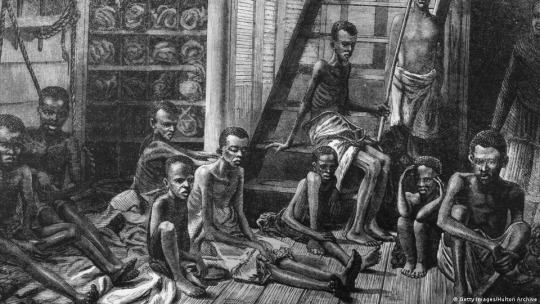
Arabs did not create the slave trade out of nothing, in fact, enslaving conquered tribes was already common practice in Central Africa when they arrived.
The West African Songhai Empire relied heavily on captured slaves in all levels of society, even as soldiers.

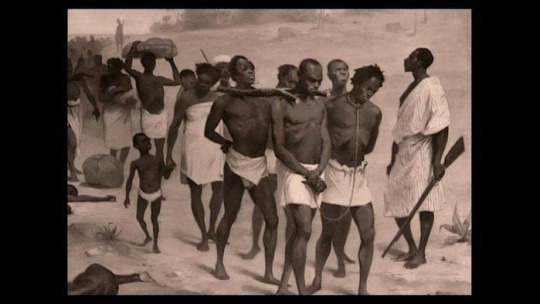
Africans themselves also played a large role in facilitating the trans-Atlantic slave trade.
African tribes conducted raids on rival groups to provide slaves for sale. African middlemen facilitated trade between European traders and African suppliers.



The Arabs also had a slave trade in Europe. Estimates are that up to 1.25 million Europeans were enslaved by Barbary pirates, who would raid villages in coastal countries like Italy, France, England and Ireland, bringing them to North Africa for sale.

In some cases entire villages would be captured, such as the Irish coastal village of Baltimore, entirely raided in 1631.
These slaves faced a brutal future, engaging in hard labour or sexual servitude, and spending nights hot and overcrowded prisons called bagnios.



Many slaves captured by Barbary pirates were sold eastwards into the Ottoman Empire. Slavery was central to the Ottoman Empire, most towns had dedicated slavery markets called Yesirs.
Slaves came from Africa, the Caucasus, the Balkans and Eastern & Southern Europe.

Sexual slavery was a big part of Ottoman society. Slavic women were popular slaves, and Köçeks became a popular source of entertainment in the 19th century:
These were young boys, usually from European backgrounds, who were circumcised, cross-dressed and trained as dancers.


Hereditrary slavery is recorded in China dating back to the Xia Dynasty in 2100 BC. Africans purchased on the Silk Road were used as a sign of wealth.
After Chinese law began to treat women as property around 1000AD it was common to sell daughters and sisters into slavery.


The Mongols enslaves tens of thousands of Chinese as punishment for resistance.
In the post-Mongol Ming Dynasty, thousands of slaves were employed to do bureaucratic jobs for the government, and rich families also employed thousands of slaves to perform menial labour.
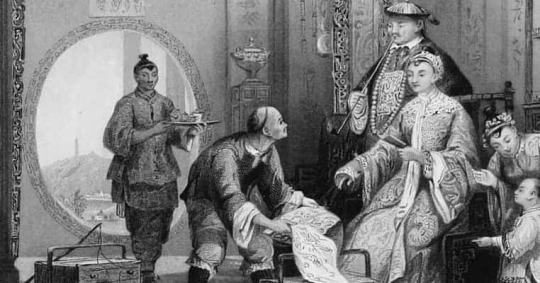
Slavery was common in American civilizations like the Aztec and Maya
Among the Aztecs, slavery was a punishment for a variety of crimes or even failure to pay taxes. Husbands and wives sold each other in times of economic hardship. Slaves were identified by wooden collars.

Slavery was also common practice in the civilizations of South-East Asia.
The Khmer Empire had a massive slave class that did much of the work building monuments like Angkor Wat. Historians estimate 25-35% of the population of Thailand/Burma were slaves in the 17th century.


Slavery also existed among Native American tribes. Slavery was common practice among Northwest tribes like the Tlingit, for whom one third of their population during the mid-1800s were slaves.
Various tribes practiced debt-slavery and enslaved captives of other tribes.

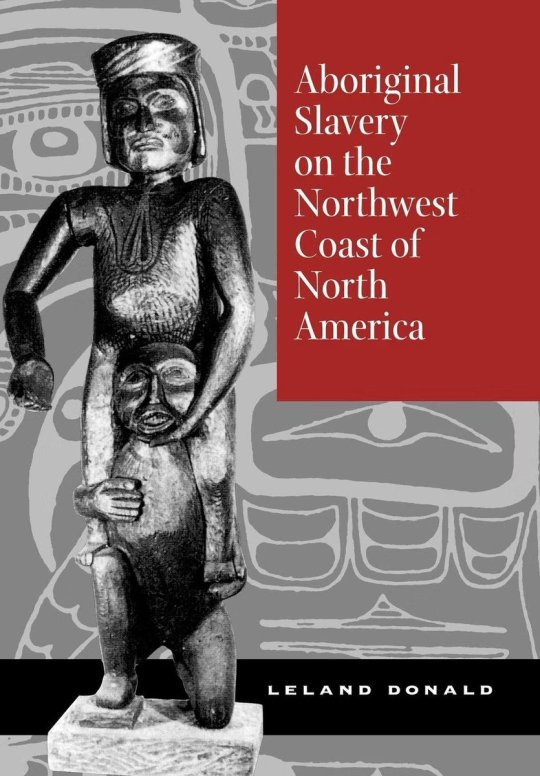
The only difference between these cases of slavery and that practiced by Europeans is that Europeans abolished slavery on humanitarian grounds, and spread this across the globe.
The intense focus on the White role in slavery is a product of widespread Anti-White animus.

==
American exceptionalism comes in two varieties: "we're exceptionally virtuous," and "we're exceptionally evil."
Both rely on lying about or being ignorant of history.
https://www.nationsreportcard.gov/dashboards/schools_dashboard.aspx
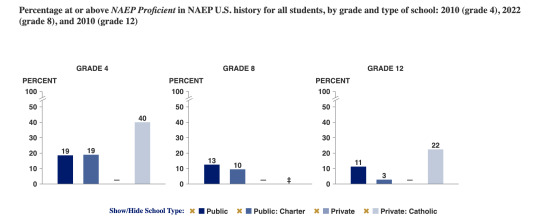
And that's just American history. Can you imagine world history?
#Keith Woods#slavery#history#history of slavery#exceptionalism#American exceptionalism#inverted exceptionalism#religion is a mental illness
26 notes
·
View notes
Text

Okay kids, I finished drawing the book I was working on. It started out as a small 5-6 page story from travel journal sketches I did in Ireland but it kept growing and became a book of its own! Now, after having written and drawn ALL of that, I realize that it's not what you would call a commercial property. I know some people may find it interesting but I don't know that their's a market for selling multiple copies and so I decided not to print the book (at least not right now). What I am doing is offering the book for FREE digitally! That means that you can read it right now for FREE! Did I mention that it's FREE? All you have to do is go to the link provided and either read or download the PDF there. It's THAT easy and it's FREE!!! I hope you enjoy it! And, if you like it, please feel FREE to check out my other books for sale at www.deadcatcomix.com No pressure.
The Link: https://www.dropbox.com/scl/fi/vh7sv03df4i6xuwtjujyl/An-Olde-Man-In-Ireland.pdf?rlkey=8gj48bmqyipk35gqu4l5k5oqx&st=g9lulfvx&dl=0
#doodles handlon#www.deadcatcomix.com#artists on tumblr#little doodles#dead cat comix#humor#comics#illustration#comic books#An Olde Man In Ireland#travel#travelogue#Ireland#dublin#maynooth university#university of indianapolis#photography#travel photography#FREE#Free Comic#Artists on Tumblr
3 notes
·
View notes
Text

Super two bedroom third floor apartment located in Carlow town centre within a short walk to a host of local amenities including shopping, train station, Carlow town park, schools and restaurants/bars. The apartment enjoys use of a communal outdoor terrace and also benefits from a private car parking space located within a secure gated residents car park - https://www.property24-7.ie/property-detail/15093
#property24-7#properties in ireland#ireland#property for sale#property for sale ireland#house for sale#houseforsaleireland#realestate
0 notes
Text


I was looking at properties for sale in Ireland (as you do) and found this truly incredible castle for sale for £950,000 which seems like a steal.

I really love the idea of reviewing somebody's home and giving it 1 star because it was locked. Sims 2 cat burglar career path behavior.
4 notes
·
View notes
Text
Widow loses life savings after ‘firetrap’ developer fails to repay €150k loan
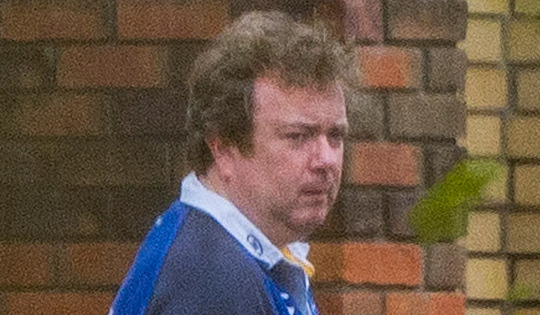
A controversial developer who asked to borrow the life savings of an 81-year-old widow has failed to repay the money after half a decade of broken promises.
In 2017, the widow gave €160,000 in cash to developer Paddy Byrne, who built the Millfield Manor estate in Co. Kildare where six houses burnt to the ground in under 30 minutes in 2015.
The cash was for a penthouse apartment in Dublin she planned to move into.
The development was built by Victoria Homes, a company that was established by Mr Byrne’s sister Joan just before Mr Byrne was precluded from acting as a company director in Ireland for five years.
After viewing plans for the €630,000 property, in a development called Greygates in Mount Merrion, the pensioner withdrew the cash from her bank and gave it to Mr Byrne.
Some €10,000 of this was a deposit, with the remaining €150,000 provided on the advice of a third party who was known to Mr Byrne and the widow, who said the cash would secure a good price.
According to a handwritten receipt, signed by Mr Byrne, the money was provided on May 29, 2017.
But in November 2017 the widow, a retired primary school teacher, found a more suitable home and asked for her money back.
Mr Byrne agreed to this, saying he would have no problem selling the penthouse and promptly refunded the €10,000 deposit.
However, he asked that the remaining €150,000 be treated as a 14-month loan and promised to pay a 10% annual interest rate.
This effectively turned the widow into an unwitting creditor of Victoria Homes.
According to a handwritten agreement, signed by Mr Byrne, the loan was to be ‘paid back from the sales proceeds’ of the penthouse at his Greygates development.
More than half a decade later, the loan remains unpaid – even after the widow made a criminal complaint to gardaí and took legal action to secure a judgement.
As it is a civil matter, the Garda investigation faltered. And because various other unpaid creditors had previously secured judgements against Victoria Homes, the widow is now unlikely to get her savings back. During the Celtic Tiger years, Paddy Byrne was renowned for his €2.4m Sikorsky helicopter and sponsorship of the Irish National Hunt festival.
But in 2011 his then-firm, Barrack Homes, went bust and Mr Byrne declared bankruptcy in Britain with debts of €100m.
He was banned from acting as a UK director for 10 years in 2012.
This ban was scheduled to end in 2022 – and ran the full course – but it only applied in the UK and Wales.
According to the UK insolvency register today, Mr Byrne’s discharge from UK bankruptcy is ‘suspended indefinitely’ until the fulfilment of conditions made in a 2012 court order.
Separately, in Ireland, he was also restricted from acting as a director for a period of five years – which ended in January 2018.
Mr Byrne is also known for building the Millfield Manor estate in Newbridge, Co. Kildare, where half a dozen houses were razed to the ground within 30 minutes in 2015.
A report into the blaze found ‘major and life-threatening serious shortfalls and discrepancies and deviations from the minimum requirements of the national mandatory building regulations’ at Mr Byrne’s development.
Today, having exited bankruptcy, Mr Byrne is best known as the figurehead behind Victoria Homes and associated businesses, which was set up by his sister and her husband in December 2012, while he was bankrupt.
Mr Byrne was not a director or owner of Victoria Homes during the period of his bankruptcy. But, in 2017, Mr Byrne’s sister and her husband stepped back from Victoria Homes, transferring their shares to an offshore entity in Belize city called Victoria Holdings.
In November 2022, the main lenders to Victoria Homes – the Lotus Development Group – forced the firm into receivership for the second time.
In 2020, Lotus had forced a previous short-lived receivership before agreeing a deal that saw Victoria Homes begin trading normally once more.
Today, Mr Byrne appears to have left Victoria Homes behind and seems to be focusing on a new firm instead.
Set up in the summer of 2020, Branach Developments is entirely owned by Mr Byrne and is not encumbered by any bank debt or mortgages as Victoria Homes was.
According to the latest filed accounts, for the year ended 2021, Branach Developments held ‘tangible assets’ of €210,000 and ‘stocks’ of €600,000.
The accounts also show that, in 2021, Mr Byrne provided the company with an interest-free loan of €1,024,438.
Just last week Mr Byrne’s new firm was one of the winners at the National Property Awards sponsored by the Business Post and Deloitte, among others.
At the award ceremony, Branach Developments took home the prize for best sustainability initiative of the year.
However, Mr Byrne, who shuns publicity and is rarely photographed, does not appear to have attended the ceremony and the award was accepted by a colleague.
This week the Irish Mail on Sunday sent queries to Mr Byrne via his mobile phone, his email at Victoria Homes and his email at Branach Developments, without response.
Queries to his solicitor and the separate accountancy firms representing Victoria Homes and Branach Developments also went unanswered as did calls to the numbers on the websites of these firms.
Mr Byrne also previously declined to respond to questions from the MoS relating to the establishment of Victoria Homes during the period of his bankruptcy.
At the time, Mr Byrne appeared to be living at Ballinrahin House, close to Rathangan on the border of Offaly and Kildare.
The home is a luxury build on 26 acres of stud-railed paddocks with six stables and a 1.3km tree-lined avenue behind electric gates.
The property was on sale for €2.8m in 2009, but land registry records confirm that, in November 2014, it was sold to Victoria Homes for a knockdown price of €484,000.
Ownership of Ballinrahin House was transferred offshore to Victoria Holdings in Belize on April 10, 2018, just weeks before Mr Byrne was due to repay the €150,000 back to the widow.
#Financial Exploitation#Real Estate Fraud#Elder Abuse#Legal Dispute#Developer Misconduct#Property Development#Bankruptcy#Civil Law
2 notes
·
View notes
Text

A little stone home of your own. 2bd home in County Cork, Ireland features a variety of faux brick/stone wallpaper. They are calling it wallpaper, but it looks 3 dimensional, so I think that it's a series of adhesive panels. The price is £161,608 / $209,676 by Private Treaty (meaning a sale where the buyer sets the price he wants for the property and negotiates w/a buyer and an agent.)


Cozy living room with a new modern fireplace. Actually, there are 2- one is on the wall.

The kitchen looks fairly roomy.


You can see the variations of brick and decorative stone, right down to the little table that the plant next to the fridge is on.

Cabinets and backsplash are covered.

The stair well.

Upstairs and the doors are even covered.

The bedrooms are so tiny, but they have skylights.

The bathroom. It's a single bath house.

This one looks a little bigger- it has 2 wood burning stoves, a little light overhead and room for a TV.
https://www.mirror.co.uk/news/weird-news/two-bed-house-makes-peoples-32544347
120 notes
·
View notes
Text
Everyone,
It's time to WAKE UP and start asking those in your community how they're going to work to stop build-to-rent communities from becoming a mainstream housing option. This isn’t just an American housing issue either. It's become a problem in Canada, the UK, Ireland, and even Australia. Home developers are no longer looking to invest in building for sale home communities. No, corporations are investigating in housing properties to build with the intent to rent. Forever.
These developments aren't new homes for sale. They're not even rent to own communities. No, they're brand new houses/condos that are being built for the sole purpose of helping corporations make a profit now that commercial real estate has become such an unpredictable market.
Americans are already familiar with the apartment living build-to-rent model that has consumed so much of the housing market that it's just natural. For my European friends, they're shocked to hear just how many apartment buildings are built for the sole purpose of being a permanent rental building. Month to month rent that has already increased nearly 50% in just 5 years.
Don't sit on this issue. Don't buy into the grand scheme that economists put out there that this will help the housing crisis because it won't. All it will do is cripple a consumer's buying power more than it already has been since the pandemic.
Housing 👏 is 👏 not👏 for👏 corporate 👏 gain.
#build to rent#affordable housing#housing crisis#first time home buyer#homeowners#rental properties#renters union#wealth inequality#corporate greed
16 notes
·
View notes
Text
Two area congressmen who sought for years to find out whether foreign adversaries or investors were behind the buying spree around a U.S. Air Force base vital to national security and the local economy are furious that Flannery kept its identity hidden for so long. The website say 97% of its funding is from U.S. investors and the rest are from the United Kingdom and Ireland. “The FBI, the Department of Treasury, everyone has been doing work trying to figure out who these people are,” U.S. Rep. Mike Thompson, who represents much of the county, said this week after meeting with Sramek. “Their secrecy has caused a lot of problems, a lot of time, and a lot of expense.” The investment group said secrecy was required until enough land was purchased, in order to avoid short-term speculation, but that it is now ready to hear from Solano households via a mailed survey and creation of a community advisory board. Past surveys showed parents were most concerned about their children’s future, the website said. [...] In many ways, Solano County is ideal for development. It is 60 miles (96 kilometers) northeast of San Francisco and 35 miles (56 kilometers) southwest of California’s capital city of Sacramento. Solano County homes are among the most affordable in the San Francisco Bay Area, with a median sales price of $600,000 last month. But Princess Washington, mayor pro tempore of Suisun City, said residents deliberately decided to protect open space and keep the area around Travis Air Force Base free of encroachment given its significance. She’s suspicious that the group’s real purpose is “to create a city for the elite” under the guise of more housing. “Economic blight is everywhere. So why do you need to spend upwards of a billion dollars to create a brand new city when you have all these other things that can be achieved throughout the Bay Area?” she said. Flannery further infuriated locals in May when it sued several landowners in court, accusing them of conspiring to fix prices for their properties. The company disclosed it had purchased or was under contract to buy about 140 properties for more than $800 million.
DIsappointed that Marc Andreessen doesn't believe in the free market and immediately calls on Big Government
17 notes
·
View notes